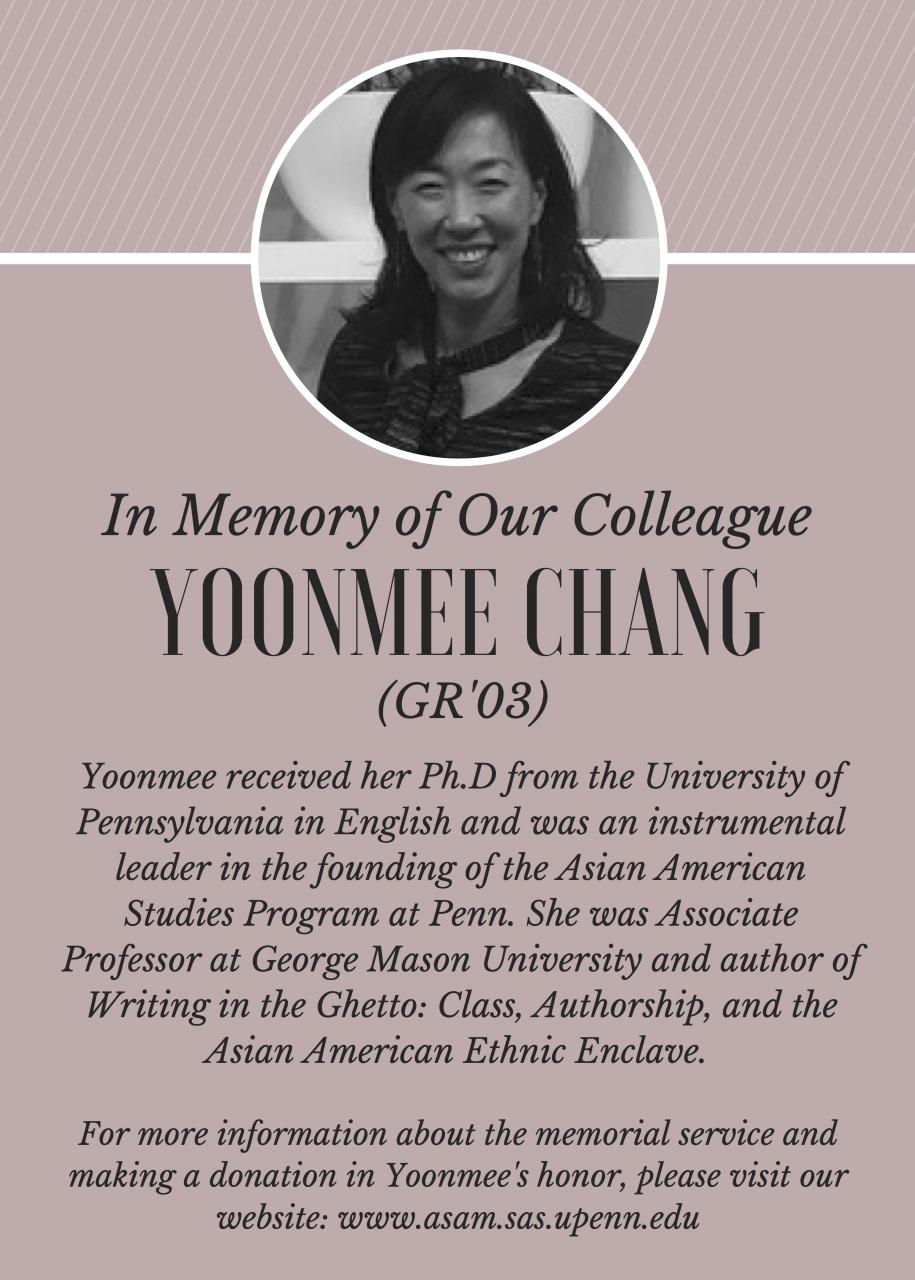She maintains that Asian American literature both contributes to and Writing the Ghetto: Class, Authorship, and the Asian American Ethnic Enclave Asian Americans are described as residing in positive-sounding "ethnic enclaves." Writing.
Table of contents
- Additional Information
- Yoonmee Chang | Department of English
- Yoonmee Chang, 'an instrumental leader' of Penn's Asian American Studies Program, died Jan. 19
He is co-author of A Principled Stand: The Story of Hirabayashi v. She has authored Missionaries, Miners, and Indians: Struggle for Land and Autonomy, — She edited Across the Pacific: His book, American Tropics: She is author of Race for Citizenship: He is author of Coolies and Cane: His current project is The Unruly Pacific: Race and the Politics of Empire and Revolution, — forthcoming. He is author of Melancholic Freedom: He is the author of The Quest for Statehood: Korean Immigrant Nationalism and U.
He is the author of Dubious Gastronomy: A former associate editor of American Quarterly , he is author of Urban Triage: Race and Fictions of Multiculturalism She is author of The Japan of Pure Invention: Race and Ethnicity on the Contemporary Stage She has co-edited with R. Essays in Cultural History He is author of Orientals: She is author of Claiming the Oriental Gateway: She is the author of The China Mystique: Lieu is an independent scholar and author of The American Dream in Vietnamese Her published works have appeared in Alien Encounters: Popular Culture in Asian America , Frontiers: She is author of Chineseness across Borders: Her most recent book is How Chinese Are You?

Her most recent monograph is Unsettled Visions: She also co-authored with Elaine H. Conversations on Asian American Art The Rise of Asian America He is author of Global Divas: Filipino Gay Men in the Diaspora He has edited the following collections: Ethnographic Explorations of Asian America She is author of Culinary Fictions: She is also author of Where Is Your Body?: He is author of Race and Resistance: Her monograph, An Ethics of Betrayal: The Politics of Otherness in Emergent U.
Additional Information
He co-authored with John S. He is the co-author with Edward J. She has authored Entitled to Nothing: She also co-authored two books with David Naguib Pellow: The Slums of Aspen: He is the author of Beyond the Nation: He is the author of Terrifying Muslims: Race and Labor in the South Asian Diaspora He also edited Pacific Citizens: She is author of Migrants for Export: A cultural enclave makes invisible class hierarchies, economic disparities, and the ongoing struggles of coethnics living and working together.
- Yoonmee Chang.
- The Crooked Mile: Through peak oil, biofuels, hybrid cars, and global climate change to reach a brig.
- Contributors.
- Contributors | Keywords for Asian American Studies;
- Yoonmee Chang, Writing the Ghetto: Class, Authorship and the Asian American Ethnic Enclave.
- Writing the Ghetto : Class, Authorship, and the Asian American Ethnic Enclave - leondumoulin.nl!
- More Articles!
According to Chang, naming an ethnic ghetto an "enclave" emphasizes how race improves class or how ethnicity improves race, both myths by which Asian Americans and their literature are unfortunately understood. Why are enclaves of African Americans considered "ghettos," she asks, but Chinatowns are [End Page ] regarded as quaint ethnic quarters, as "cultural communities" worthy of tourism?
Yoonmee Chang | Department of English
She continues, "race has come to be a metonym for class inequity for blacks. But how has race come to signal just the opposite for Asian Americans?
The effects of such oversight constrain not only Asian American political and economic upward mobility, Chang argues, but also Asian American literary, ethnographic, and social practices. Chang situates her analysis in ongoing debates in the fields of both Asian American and American studies, especially those encouraging discussions of the inextricability of race and class. She pushes against recent arguments, such as that proposed by Walter Benn Michaels in his call to consider class over race. Her work rests admirably with that of Lisa Lowe, who examines how culture is driven by politics and economics, or accords with that of Viet Nguyen, who finds that one particularly powerful ethnographic imperative—that analyses of Asian American literature must cleave to models of literary-political protest even if such assignations are not evident or available—obscures other more pressing arguments regarding the structural class inequities faced by Asian Americans.
Yoonmee Chang, 'an instrumental leader' of Penn's Asian American Studies Program, died Jan. 19
Chang's second chapter in particular, "Like a Slum," is an excellent and careful explanation of why the ethnic enclave is more like a ghetto and what social, political, and literary implications exist in approaching it as such; what consequences have arisen in its definition as ethnic enclave? In this chapter, she carefully maps the term "ghetto" as defined by Chicago School sociologist Robert Park in the s and s, an "immigrant colony," one both structurally imposed and self-created, easing the pressures of the newly arrived.
Yet according to Park, it is a transitory space from which residents leave to pursue better lives outside the ghetto. In such a model, culture is pathologized. Chang also investigates other sociological models that emphasize, seemingly contra Park, the ethnic agency and community embedded in the term "ethnic enclave," but finds that they often reemphasize Park's assimilationist bent.
Chang proposes a return to the term "ghetto" because it so effectively emphasizes imposed class inequities ushered in by legislation and public policies while still promoting how coethnic cooperation is self-selected.